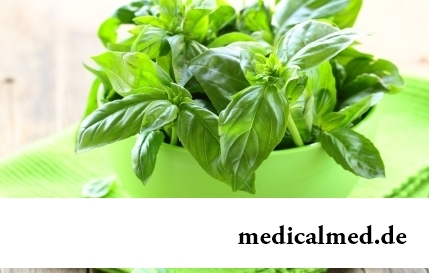





L-thyroxine
Application instruction:
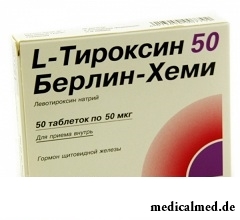 L-thyroxine – thyritropic drug, hormone of a thyroid gland.
L-thyroxine – thyritropic drug, hormone of a thyroid gland.
Form of release and structure
Medicine is produced in the form of tablets (on 10 pieces in blister strip packagings, on 2, 3, 4, 5, 6, 8 or 10 packagings in a cardboard pack; on 20 or 50 pieces in polymeric containers, on 1 container in a cardboard pack; on 50 pieces in blister strip packagings, on 1, 2, 4, 5, 6, 8 or 10 packagings in a cardboard pack; on 50 pieces in blisters, on 1 blister in a cardboard pack).
1 tablet contains active agent: sodium left thyroxine – 50 or 100 mkg.
Indications to use
- Euthyroid craw;
- Hypothyroidism;
- The period after a resection of a thyroid gland (for the purpose of prevention of a recurrence of a craw and as replacement therapy);
- Cancer of a thyroid gland (after surgical treatment);
- Diffusion toxic craw (for monotherapy or as a part of complex treatment on reaching an euthyroid condition of a tireostatikama);
- Test of thyroid suppression (as diagnostic means).
Contraindications
Absolute:
- Acute myocardial infarction, acute myocarditis;
- Not treated thyrotoxicosis;
- Not treated adrenal insufficiency;
- Hereditary lactose intolerance or lactose intolerance (disturbance of absorption of glucose and galactose);
- Hypersensitivity to left thyroxine.
Relative (drug needs to be taken with caution):
- Diseases of cardiovascular system: arterial hypertension, arrhythmias, coronary heart disease (a myocardial infarction in the anamnesis, atherosclerosis, stenocardia);
- Diabetes mellitus;
- Heavy (it is long existing) a hypothyroidism;
- Sprue (dose adjustment perhaps will be required).
The overdose of L-thyroxine is shown by the symptoms characteristic of a thyrotoxicosis: disturbance of a heart rhythm, heartbeat, heartaches, tremor, concern, sleep disorder, increase in appetite, hyperhidrosis, diarrhea, weight reduction. The doctor can recommend (depending on symptomatology): decrease in a daily dose of drug, several days of a break in treatment, purpose of β-adrenoblockers.......... Therapy should be continued with care after passing of side effects from lower dose.
Route of administration and dosage
Pill is taken inside in the morning on an empty stomach, at least in 1/2 hours prior to meal, without chewing and washing down with a small amount (1/2 glasses) of water.
The daily dose of L-thyroxine is defined by the attending physician individually and depends on indications.
For performing replacement therapy of a hypothyroidism at patients 55 years, in case of absence of cardiovascular diseases, the recommended daily dose of L-thyroxine – 1,6-1,8 mkg/kg of body weight are younger. To patients 55 years are more senior or in the presence of cardiovascular diseases the dose is defined at the rate of 0,9 mkg/kg of body weight. Calculation is made by the patient with a gross obesity (IMT – a body weight index ≥ 30 kg/sq.m) on "the ideal weight".
At the initial stage of replacement therapy at a hypothyroidism the recommended left thyroxine dose:
- Patients without cardiovascular diseases aged up to 55 years: men – 100-150 mkg/days, women – 75-100 mkg/days;
- Patients are more senior than 55 years and/or with cardiovascular diseases: irrespective of a floor – 25 mkg/days with gradual increase in a dose (on 25 mkg at an interval of the 2nd month), before normalization of an indicator of thyritropic hormone (TTG) in blood.
In case of emergence or aggravation of symptoms from cardiovascular system it is necessary to carry out correction of a course of treatment of cardiovascular diseases.
The recommended daily doses of L-thyroxine for therapy of an inborn hypothyroidism, depending on age of the child (a dose a left thyroxine left thyroxine/dose per body weight):
- From the birth to 1/2 years – 25-50 mkg / 10-15¼¬ú/kg;
- From 1/2 to 1 years – 50-75 mkg / 6-8 mkg/kg;
- From 1 year to 5 years – 75-100 mkg / 5-6 mkg/kg;
- From 6 to 12 years – 100-150 mkg / 4-5 mkg/kg;
- 12 years – 100-200 mkg / 2-3 are more senior than mkg/kg.
The recommended daily doses of L-thyroxine depending on a state/disease:
- Therapy of an euthyroid craw – 75-200 mkg;
- Prevention of a recurrence after operational treatment of an euthyroid craw – 75-200 mkg;
- Thyrotoxicosis (as a part of complex therapy) – 50-100 mkg;
- Cancer of a thyroid gland (for suppressive therapy) – 150-300 mkg;
- Test of thyroid suppression – in 3-4 weeks prior to the test – 75 mkg, in 1-2 weeks prior to the test – 150-200 mkg.
Children from the birth and up to 3 years a daily dose of left thyroxine are given in 1/2 hours prior to the first feeding (in one step). Just before use the tablet needs to be dissolved in water before formation of a thin suspension.
In case of a hypothyroidism L-thyroxine is accepted, as a rule, throughout all life. For treatment of a thyrotoxicosis medicine is used in a complex with anti-thyroid drugs after achievement of an euthyroid state. Duration of a course of therapy by left thyroxine at any states / diseases is defined by the attending physician.
Side effects
At use of L-thyroxine with observance of all recommendations and under medical control side effects were not noted.
In case of hypersensitivity to left thyroxine allergic reactions are possible. Other side effects can develop only at drug overdose.
Special instructions
In case of the hypothyroidism caused by damage of a hypophysis it is necessary to carry out diagnosing and to find out whether there is no insufficiency of bark of adrenal glands at the same time. At a positive take it is necessary to begin replacement therapy of GKS (glucocorticosteroids) before reception of thyroid hormones for treatment of a hypothyroidism to avoid development of acute adrenal insufficiency.
Periodically it is necessary to control concentration of TTG in blood, increase in this indicator speaks about insufficiency of a dose of L-thyroxine.
Left thyroxine does not influence concentration of attention and speed of the psychomotor reactions necessary for control of difficult mechanisms and vehicles.
Medicinal interaction
Mutual influence of the following substances / drugs and left thyroxine at simultaneous use:
- Insulin and peroral hypoglycemic drugs – can be required increase in their dose (at the beginning of therapy by sodium left thyroxine, as well as in case of change of the mode of dosing, it is necessary to check more often concentration of glucose in blood);
- Indirect anticoagulants, tricyclic antidepressants – their action amplifies (the dose decline can be required);
- Kolestipol, Colestyraminum, aluminum hydroxide – reduce concentration in a sodium left thyroxine blood plasma because of reduction in the rate of absorption it in intestines;
- Anabolic steroids, asparaginase, Tamoxifenum – there is a probability of pharmacokinetic interaction at the level of protein-binding;
- Cardiac glycosides – their efficiency decreases;
- Salicylates, Clofibratum, furosemide (in high doses), Phenytoinum – increase contents in a blood plasma of the left thyroxine of sodium and free thyroxine (T4) which is not connected with proteins; Phenytoinum reduces the volume of the left thyroxine connected with proteins by 15%, concentration of T4 – for 25%;
- Estrogensoderzhashchy drugs – increase amount of tiroksinsvyazyvayushchy globulin that can increase the need for left thyroxine at some patients;
- Somatotropinum – acceleration of closing of epiphyseal regions of growth is possible;
- Phenobarbital, carbamazepine and rifampicin – can increase clearance of left thyroxine of sodium owing to what increase in its dose is probable;
- Aminoglutetimid, Amiodaronum, p-aminosalicylic acid (PASK), anti-thyroid drugs, β-adrenoblockers, Etioniamidum, carbamazepine, Chlorali hydras, a levodopa, diazepam, a dopamine, Metoclopramidum, somatostatin, ловастатин – exert impact on metabolism and distribution of L-thyroxine.
Terms and storage conditions
To store in dry, protected from light, the place, unavailable to children, at a temperature not above 25 °C.
Period of validity – 3 years.
Name of drug
Price
Drugstore
In operating time our brain spends the amount of energy equal to the 10 Watts bulb. So the image of a bulb over the head at the time of emergence of an interesting thought is not so far from the truth.
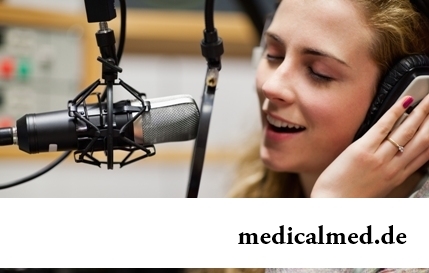
All like to sing. Small children with pleasure are engaged in a vocal, not especially thinking of hit in a melody. Adults most often...
Section: Articles about health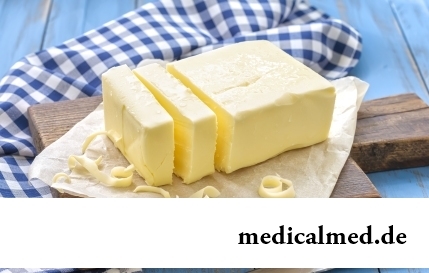
Within several decades of our compatriots convinced that the use of butter nasty affects a condition of coronary vessels. As a result the reputation of a product was impaired thoroughly a little, and many almost ceased to include...
Section: Articles about health
The brain of the person is studied not one hundred years, but the quantity of the riddles connected with this body increases rather, than decreases. Perhaps, numerous delusions concerning a structure and functioning of a brain are explained by it, many of which arose long ago, but continue to exist and today. Such we are ready to acquaint readers with the most widespread myths....
Section: Articles about health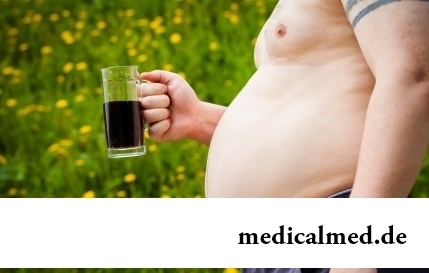
There is a lot of fans of beer in our country. Statistically, on each average Russian (including women and children) in...
Section: Articles about health
The winter swimming in open reservoirs called in our country by "winter swimming" – officially recognized sport and one of the most extreme ways of a hardening of an organism. This occupation has an old story and adherents in many countries. Are annually carried out...
Section: Articles about health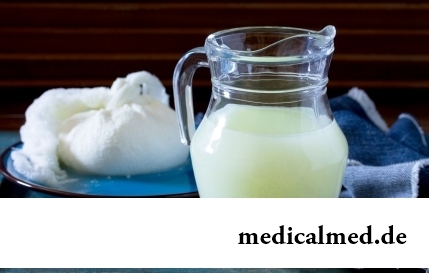
Milk and products of its processing by right occupy one of the main places in a diet of the modern person. They contain proteins, necessary for normal life activity, fats, vitamins and microelements, and are an important part of various medical diets....
Section: Articles about health
One of the major chemical processes happening in a human body are oxidation reactions. They go with participation of fats...
Section: Articles about health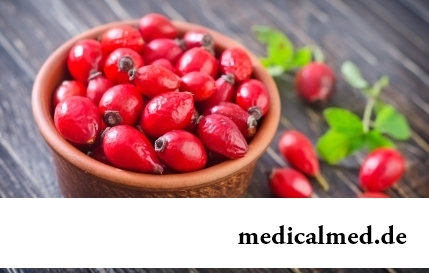
Tea is loved and use almost everything. This drink has tonic properties, contains the tannins capable to suppress activity of causative organisms. Recently great popularity was gained by teas with vegetable additives. Лечеб...
Section: Articles about health
Nightmares belong to the most unpleasant frustration. Statistically, they happen at 4% of adults, and almost at 70% of children and teenagers. During a nightmare of people dreams himself in extremely difficult, life-threatening situation. He wakens suddenly, in a condition of a fright, and, as a rule, remembers the dream distinctly. The feeling of depression and alarm does not release throughout the day, creating hindrances for work and normal communication. If such episodes repeat often, can р...
Section: Articles about health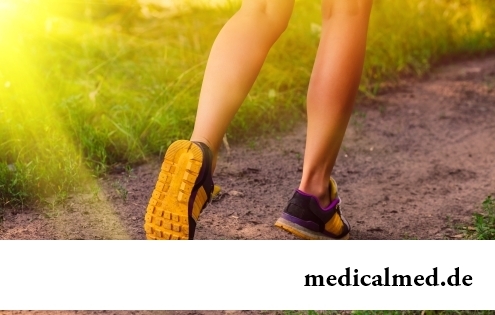
During foot walks blood moves on vessels more actively and one and all bodies are supplied with a large amount of oxygen. N...
Section: Slideshow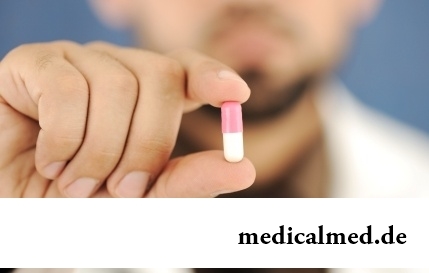
The drugs stopping or oppressing life activity of pathogenic microorganisms are widely applied in clinical practice from 40th years of the last century. Originally antibiotics were called only substances natural (animal, vegetable or микробног...
Section: Articles about health
Color of plants is caused by presence at them of certain chemical compounds. Let's talk about what is meant by various colors of vegetables and fruit and what properties they give them....
Section: Articles about health
"Epilepsy" doctors made the diagnosis in antique times. Displays of an illness and pattern of its development are very well studied. Odes...
Section: Articles about health
It seems, quite recently you brought the baby from maternity hospital, but time flew by, and here it is already going to join the first in life children's collective. How to prepare the child for visit of a garden? What needs to teach him to facilitate process адап...
Section: Articles about health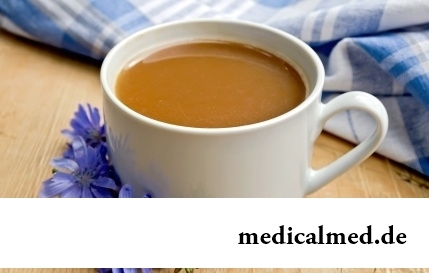
Coffee - the tonic loved by many for the invigorating aroma and deep taste. Having the stimulating effect, coffee increases working capacity, promotes concentration of attention, fights against drowsiness and improves mood. Statistically, about 30% of inhabitants of the planet regularly use coffee, from them more than 8% are "coffee-achievers" - the persons using more than 3 cups of drink a day....
Section: Articles about health
You heard that laughter prolongs life? To establish longevity direct link with sincere fun to researchers yet not удалос...
Section: Articles about health
Heart disease and blood vessels lead to disturbance of blood supply of bodies and fabrics that involves failures in their work, deterioration in health of the person, decrease in its working capacity and standard of living. Annually such perishes from pathologies more...
Section: Articles about health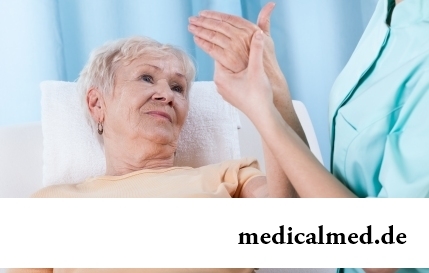
Osteoporosis this general disease which main sign is decrease in density of a bone tissue. On distribution width it takes the fourth place among noninfectious diseases. The illness develops at mature age more often: in our country about a third of women and a quarter of men suffers from it 50 years are more senior....
Section: Articles about health
What woman does not dream of a beautiful and thick hair? So far physicians developed difficult schemes on hair transplant, in the bet industry...
Section: Articles about health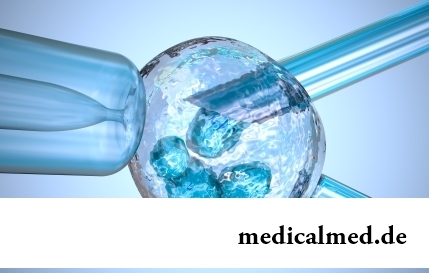
EKO, or extracorporal fertilization - a method of treatment of infertility which became the reason of a set of broken-down copies in due time accused the people working on its creation neither more nor less of rivalry good luck. Already very few people deny the rights...
Section: Articles about health
All parents are ready to what the baby often and pisat much. Since then, as the absorbing diapers strongly became current, keeping of the kid in dryness does not represent any problems. But if the grown-up kid continues to urinate in panties, parents begin to feel concern – whether it is normal, or the kid has an urine incontience? Let's try to understand what is enuresis why it arises at children and at what age it is necessary to begin it to treat....
Section: Articles about health
The words "disease" and "patient" not without reason come from one root – "pain". As a rule, symptoms of illnesses thoroughly spoil the patient...
Section: Articles about health
The sudden heat on all body which is followed by perspiration and a cardiopalmus – the phenomenon familiar to many people. Most often such states called by "inflows" result from nervous or physical overworks and disappear right after rest. Odn...
Section: Articles about health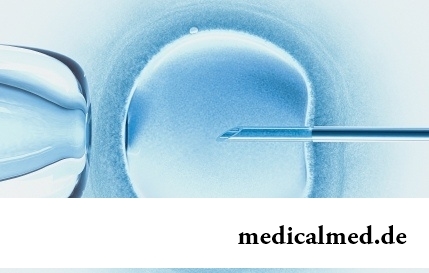
Extracorporal fertilization – one of the most modern methods of controlling with infertility. So far he already helped a significant amount of married couples to become happy parents. Usually to the EKO procedure difficult and very expensive, resort in those situations when all other ways to help couple to bring the child are inefficient. "Conception in a test tube" yields quite good results in cases of infertility of one of partners, existence at the woman of impassability of uterine tubes...
Section: Articles about health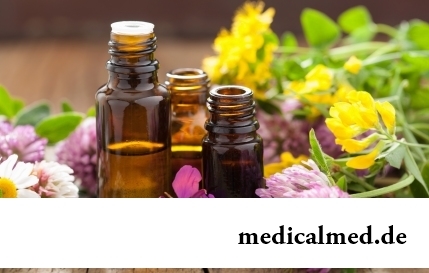
Any of us is not insured from a heavy illness of the loved one. Happens and so that someone from family members becomes lying бо...
Section: Articles about health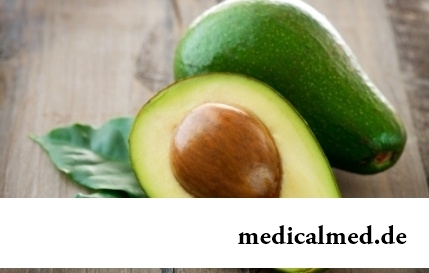
Life does not indulge the modern woman special emotional comfort and carelessness. The fatigue, troubles at work, misunderstanding in a family and various illnesses immediately affect a condition of hair and skin. And to look safe and attractive so хоч...
Section: Articles about health
Practice of use of table salt in the therapeutic purposes contains not one century. Applications which do by means of the fabric impregnated with saline solution are considered especially effective. They have antibacterial and antiinflammatory effect, help to heal wounds, exempt fabrics from excess liquid. Hypertonic salt solution of potassium chloride is applied outwardly at many morbid conditions. Let's tell about the most known of them....
Section: Articles about health

